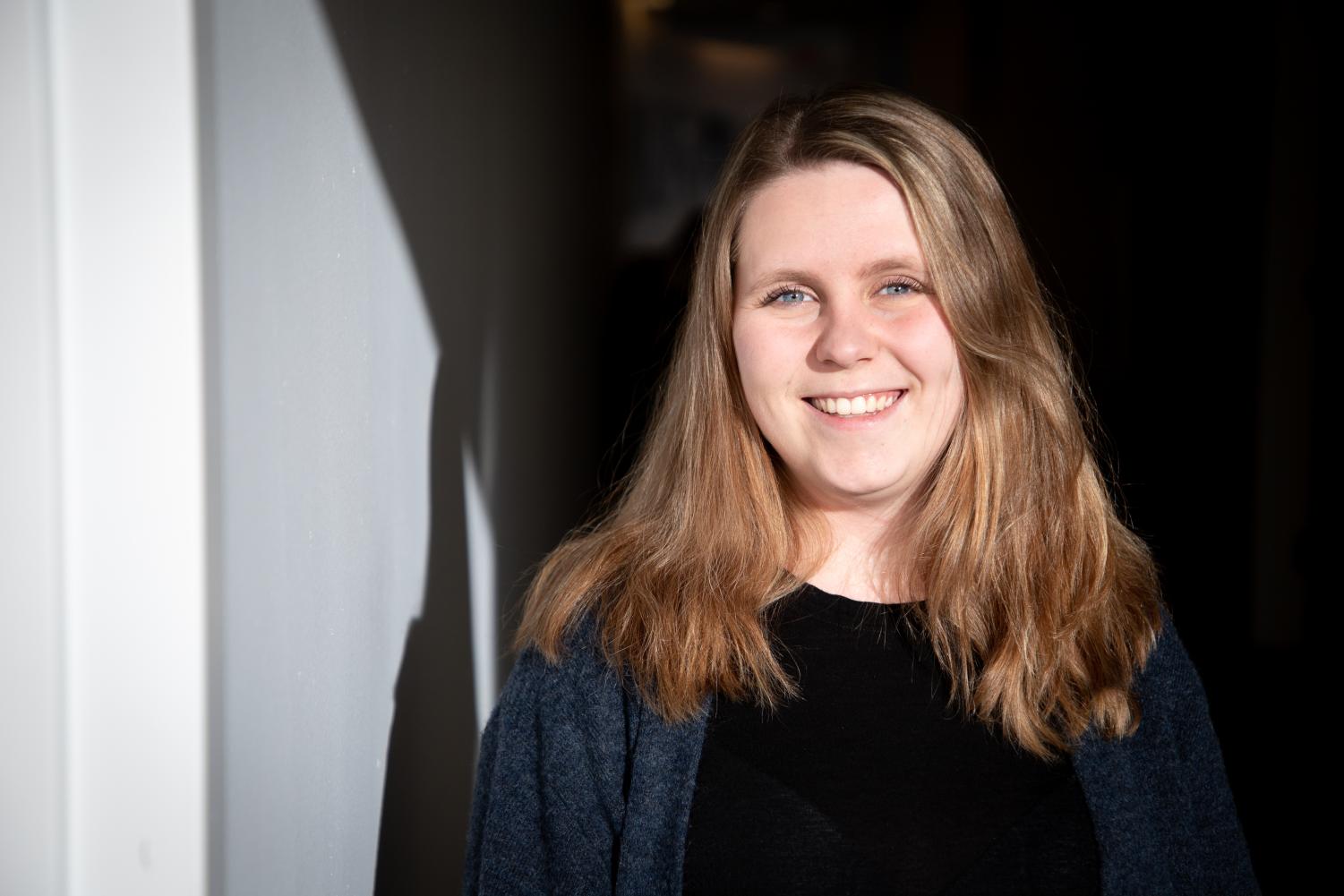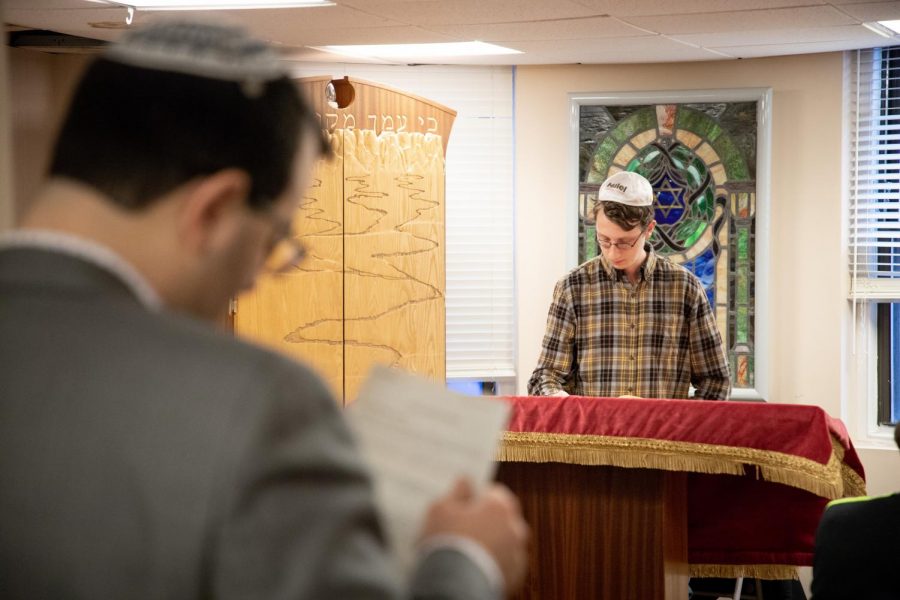NU Jewish community struggles with conflict between finals and Passover
Randy Evers, a second-year economics major and Hillel Shabbat chair, leads prayers during Shabbat service Friday at Northeastern Hillel.
March 27, 2019
For the Jewish community at Northeastern, final exams come with an added stress this spring. The exam period — April 19 to 26 — coincides directly with Passover, one of Judaism’s most important holidays.
Passover is an eight-day holiday that commemorates the liberation of the Jewish people from Egyptian slavery as described in the Hebrew Bible. It is traditional for families to host a seder, a ritual dinner, at their home, where the story of Passover is told. Passover has a specific Kosher diet and multiple periods of non-working days.
Many in the Jewish community at Northeastern are concerned about coordinating their exam-related responsibilities with holiday observance.
“It’s been stressful thinking about planning when I’ll be able to study because of this important holiday,” said Eva Gaufberg, a fourth-year psychology major. “I definitely won’t be able to celebrate it the way I’d like to.”
Aaron Abecassis, a first-year finance major, has exams on both Friday mornings during finals week and will not have time to take a train or bus home to New Jersey before the holiday begins. He said that he did not realize the conflict until after conflict forms were due.
Students with a final exam conflict had the option to file a conflict form between when the exam schedule was released on Jan. 23 and when the forms were due on Jan. 30. The possible final exam conflicts are listed on the registrar website as having “three finals in one day” and “two finals at the same time” — religious conflicts are not mentioned.
Daniel Aldrich, a professor of political science at Northeastern and a practicing Jew, is also affected by the conflict between Passover and finals.
“I have to balance my duty to students and to ensuring that the class is done, with my desire to take part in the rituals and beliefs with which I strongly identify,” Aldrich said. He said that students often come to him for assistance when they have academic requirements that conflict with Jewish holidays.
Northeastern’s Policy on Instructional Accommodations For Student Religious Observance states that “when any student is unable, because of religious practice, to attend class or participate in an examination or any other required assignment or activity in any course in which she or he is enrolled, the course instructor shall provide reasonable opportunity to make up the examination, assignment or activity.”
NU response falls short for some
In an email to all active students on March 21, Madeleine Estabrook, senior vice chancellor for student affairs, wrote, “Northeastern is committed to honoring the religious commitments of all members of our community, including faculty, staff and students.
“Both Northeastern’s policy and Massachusetts law provide that students and employees of the university may be allowed to take time off for religious observances. Students unable to attend classes, participate in required course activities or take a scheduled examination because of religious observance should be provided with reasonable opportunity to make up the course work without adverse effects.”
Estabrook also wrote that students have the option to request that their exams be rescheduled and that faculty may use personal time to observe Passover. All faculty members received a nearly-identical email from Debra L. Franko, the senior vice provost for academic affairs.
Gaufberg said that while she appreciates the recognition, the university’s statement does not change anything for her.
“I’d have to take all my finals much earlier and most of my classes are going to teach right up until the last class, so I would have no time to study and may actually still be learning material,” she said. “I don’t think I will be contacting my professors to try to take them earlier because I would probably do much worse on my exams.”

Avital Brodski had to reschedule a final as a result of the conflict.
Avital Brodski, a second-year environmental science and media and screen studies combined major, said she worked with her professor to reschedule a final presentation that fell during Passover. Brodski said she was planning on going home to Philadelphia and did not want to have to find a seder in Boston while also preparing for the presentation. She said that she thinks the email sent out by Northeastern was too late to be effective.
“I think they sent that after a lot of people were complaining,” Brodski said.
Aldrich, however, was pleased to see Northeastern’s sensitivity to the scheduling needs of students and faculty.
“It makes accommodation far easier when we have support from the administration,” Aldrich said.
The March 21 email from Estabrook was a game-changer for Abecassis — after receiving it, he decided to email his professors and make sure he could go home for both weekends of Passover.
Conflict persists year-round
Northeastern has the 19th-highest Jewish population among private universities in the U.S. with Jewish students making up 6 percent of the undergraduate population and 4 percent of the graduate population, according to self-reported data from Hillel. However, some students feel that their minority status often forces them to make compromises between their education and their religious traditions.
One Jewish graduate student said she has often struggled to reconcile her faith with her education at Northeastern. The student, who wished to remain anonymous for fear of “falling out of [her] program’s good graces and not getting the best placements [she] can,” does not have final exams during the non-working days of Passover this year, but she has experienced conflicts with academics and holidays in the past.
“In many cases, especially for holidays, I modify my observance to not inconvenience my professors,” she said. “As a minority group, we have choices as to what we are willing to give in order to be educated at a top university.”
Gilad Skolnick, executive director of Northeastern Hillel, said he has found the administration to be very accommodating and believes it to be the responsibility of the student to “know their rights and bring this conflict to the attention of the right people.”
Based on the academic calendars out for upcoming years, another conflict with Passover and final exams is not in the foreseeable future. Although this particular convergence will not happen again any time soon, Jewish students will always have conflicts to deal with, said Lori Lefkovitz, Ruderman professor of Jewish studies and the director of Northeastern’s Jewish studies program.
“This is part of what it means to be Jewish in the adult world,” Lefkovitz said. “Conflicts will be inevitable for you your whole life.”
Lefkovitz said Jewish students should view this as an opportunity to affiliate.
“You shouldn’t feel isolated in your needs,” Lefkovitz said. She recommended students attend seders on campus through Chabad, Hillel or community members if they are unable to return home in time.
“Jewish students should seek out community on campus and talk to each other about their needs,” she said.







